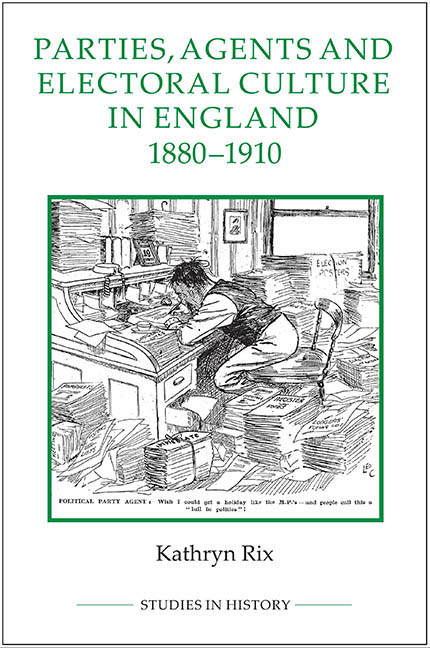Book contents
- Frontmatter
- Dedication
- Contents
- Tables
- Acknowledgements
- Abbreviations
- Introduction
- 1 The changing electoral system
- 2 The rise of the professional agent
- 3 The agents as aspiring professionals
- 4 The agents in the constituencies: registration and political education
- 5 The Agents in the Constituencies: The Social Side of Politics
- 6 Electioneering: the candidates
- 7 Electioneering: the campaign
- Conclusion
- Bibliography
- Index
- Frontmatter
- Dedication
- Contents
- Tables
- Acknowledgements
- Abbreviations
- Introduction
- 1 The changing electoral system
- 2 The rise of the professional agent
- 3 The agents as aspiring professionals
- 4 The agents in the constituencies: registration and political education
- 5 The Agents in the Constituencies: The Social Side of Politics
- 6 Electioneering: the candidates
- 7 Electioneering: the campaign
- Conclusion
- Bibliography
- Index
Summary
The function and standing of the political agent was transformed between 1880 and 1910. While some constituencies, mainly large urban boroughs, had appointed non-solicitors before 1880, the decades after 1880 were the critical period in the emergence of the professional agent. The marked shift away from solicitor agency was prompted by the electoral reforms of 1883–5, the increased burden of registration work, and the expansion of the local political arena with elections for county, district and parish councils, which all placed growing demands on party organisation as it sought to harness the support of a mass electorate. It was reinforced by the agents’ establishment of their own national professional bodies – by the Liberals in 1882 and 1893, and by the Conservatives in 1891 – which aimed to demonstrate that individuals from a variety of backgrounds, often rather humble, were capable of acquiring the knowledge and skills necessary to perform the increasingly wide-ranging duties of the political agent.
In exploring the transition to professional agency, this study has shed light on its impact on late-Victorian and Edwardian political and electoral culture, evaluating what ‘professionalized politics’ meant in practice. Firstly, it is important to note its limitations. Legal dominance of political agency may have ended, but the NSCA and its Liberal counterparts had not established their own professional monopoly. Reflecting the continued diversity of local party organisation, constituencies remained free to appoint a qualified agent, an unqualified man, a solicitor, a part-timer or indeed no agent at all, and candidates could still turn to solicitors as election agents. The merits of professional agency were not universally accepted and, if they had successfully overcome the association of the political agent with venality and electoral malpractice, the professional agents had not yet fully removed the pejorative taint of wirepulling. In an example of the lingering suspicion of professional agency, the Liberal election agent at the 1908 Peckham by-election – not a professional – was reluctant to accept the assistance of professional agents from other constituencies, describing them as ‘sharks’.
The professional agent had, however, become a firmly established feature of the political landscape by 1910.
- Type
- Chapter
- Information
- Parties, Agents and Electoral Culture in England, 1880-1910 , pp. 238 - 246Publisher: Boydell & BrewerPrint publication year: 2016



